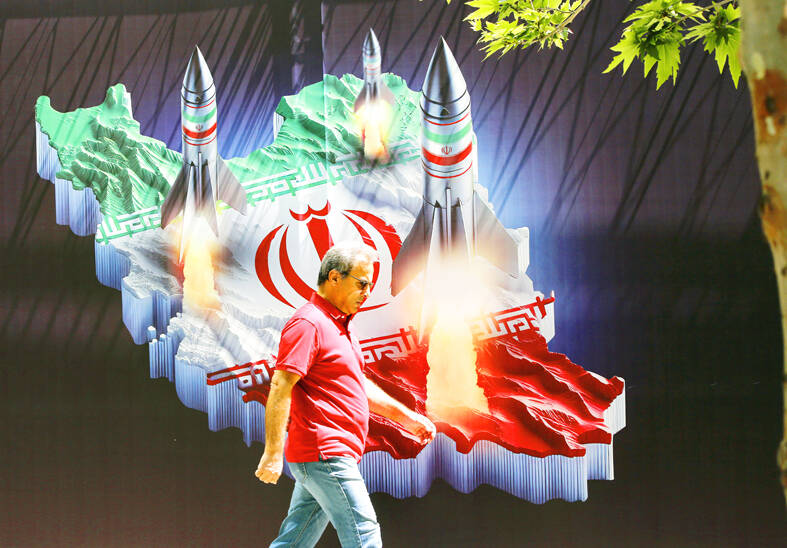Iranian state media yesterday reported explosions in the central province of Isfahan, as US media quoted officials saying Israel had carried out retaliatory strikes against its archrival.
Israel had warned it would hit back after Iran fired hundreds of missiles and drones at Israel almost a week ago, in retaliation for a deadly strike — which Tehran blamed on its foe — that leveled Iran’s consular annex at its embassy in Syria.
Fears of a major regional spillover from the war in Gaza between Israel and Iran-backed Palestinian militants have since soared. Appeals by world leaders for de-escalation again echoed yesterday.

Photo: EPA-EFE
Air defense systems over several Iranian cities were activated, state media reported, after the nation’s official broadcaster said explosions were heard near Isfahan city.
There had been no reaction from Israeli or Iranian officials, and the extent of the damage remained unclear.
An anonymous Israeli official told the Washington Post that the strike was retaliation for Iran’s barrage and intended to signal that Israel had the ability to strike inside Iran.
Iran’s Tasnim news agency, citing “informed sources,” denied that Iran had been attacked from outside.
“Contrary to the rumors and claims” made in foreign media, “there are no reports of an attack from abroad on Iran’s central city of Isfahan or any other part of the country,” Tasnim said.
Three Iranian officials told the New York Times that small drones carried out the attack, possibly launched from inside Iran, and that its radar systems had not detected unidentified aircraft entering Iranian airspace.
Fars news agency reported “three explosions” close to Qahjavarestan, near Isfahan airport and the Eighth Shekari army airbase, while Iran’s space agency spokesman Hossein Dalirian said “several” drones had been “successfully shot down.”
Dalirian said on social media that there were “no reports of a missile attack.”
“Reports indicate there was no major damage or large explosions caused by the impact of any air threat,” the official IRNA news agency said.
The senior military officer in Isfahan, Brigadier General Siavash Mihandoost, told state TV that people had heard defense systems shooting at a target in the air, not an explosion on the ground.
Nuclear facilities in Isfahan were reported to be “completely secure,” Tasnim said, and the UN’s atomic watchdog confirmed “no damage” to Iran’s nuclear sites.
Washington received advance notice of Israel’s reported strike, but did not endorse the operation or play any part in its execution, US media quoted officials as saying.
US President Joe Biden had promised “ironclad” support for Israel, but also urged it to “think carefully and strategically” before launching a response against Iran that could trigger a wider war.
Last weekend Iran carried out its first-ever attack directly targeting Israel, its regional foe.
Israel, along with the US and other allies, intercepted most of the more than 300 missiles and drones which Israel said Iran had launched. Minor damage and no deaths resulted.
Iran attacked in retaliation for the April 1 strike on its consulate in Damascus, which killed seven of Iran’s Revolutionary Guards.

A magnitude 7.0 earthquake struck off Yilan at 11:05pm yesterday, the Central Weather Administration (CWA) said. The epicenter was located at sea, about 32.3km east of Yilan County Hall, at a depth of 72.8km, CWA data showed There were no immediate reports of damage. The intensity of the quake, which gauges the actual effect of a seismic event, measured 4 in Yilan County area on Taiwan’s seven-tier intensity scale, the data showed. It measured 4 in other parts of eastern, northern and central Taiwan as well as Tainan, and 3 in Kaohsiung and Pingtung County, and 2 in Lienchiang and Penghu counties and 1

A car bomb killed a senior Russian general in southern Moscow yesterday morning, the latest high-profile army figure to be blown up in a blast that came just hours after Russian and Ukrainian delegates held separate talks in Miami on a plan to end the war. Kyiv has not commented on the incident, but Russian investigators said they were probing whether the blast was “linked” to “Ukrainian special forces.” The attack was similar to other assassinations of generals and pro-war figures that have either been claimed, or are widely believed to have been orchestrated, by Ukraine. Russian Lieutenant General Fanil Sarvarov, 56, head

FOREIGN INTERFERENCE: Beijing would likely intensify public opinion warfare in next year’s local elections to prevent Lai from getting re-elected, the ‘Yomiuri Shimbun’ said Internal documents from a Chinese artificial intelligence (AI) company indicated that China has been using the technology to intervene in foreign elections, including propaganda targeting Taiwan’s local elections next year and presidential elections in 2028, a Japanese newspaper reported yesterday. The Institute of National Security of Vanderbilt University obtained nearly 400 pages of documents from GoLaxy, a company with ties to the Chinese government, and found evidence that it had apparently deployed sophisticated, AI-driven propaganda campaigns in Hong Kong and Taiwan to shape public opinion, the Yomiuri Shimbun reported. GoLaxy provides insights, situation analysis and public opinion-shaping technology by conducting network surveillance

‘POLITICAL GAME’: DPP lawmakers said the motion would not meet the legislative threshold needed, and accused the KMT and the TPP of trivializing the Constitution The Legislative Yuan yesterday approved a motion to initiate impeachment proceedings against President William Lai (賴清德), saying he had undermined Taiwan’s constitutional order and democracy. The motion was approved 61-50 by lawmakers from the main opposition Chinese Nationalist Party (KMT) and the smaller Taiwan People’s Party (TPP), who together hold a legislative majority. Under the motion, a roll call vote for impeachment would be held on May 19 next year, after various hearings are held and Lai is given the chance to defend himself. The move came after Lai on Monday last week did not promulgate an amendment passed by the legislature that